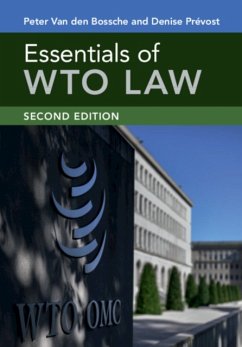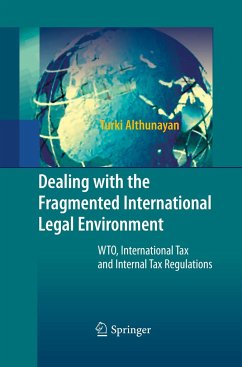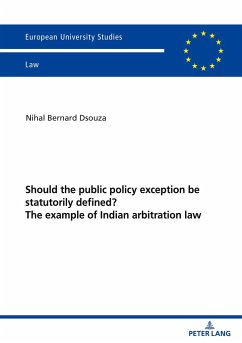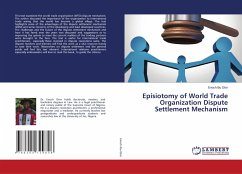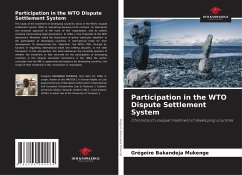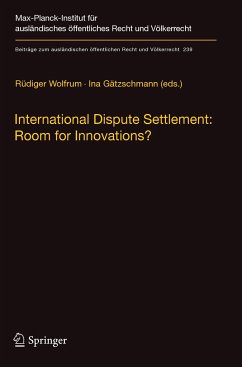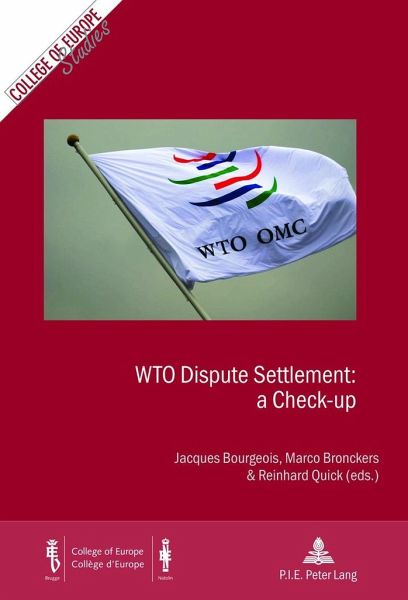
WTO Dispute Settlement: a Check-up
Versandkostenfrei!
Versandfertig in 6-10 Tagen
55,30 €
inkl. MwSt.
Weitere Ausgaben:

PAYBACK Punkte
0 °P sammeln!
The dispute settlement system of the World Trade Organisation has been referred to as the jewel in the crown of the WTO. Reviewing more than twenty years of the system's operation, this volume takes stock by providing an in-depth analysis of key issues that have emerged. The book collects and updates papers by a group of eminent experts that were presented at an international conference at the College of Europe in Bruges. The fundamental question of whether the system is in good shape or whether changes are necessary is addressed through five themes.Firstly, the book looks at the interpretive ...
The dispute settlement system of the World Trade Organisation has been referred to as the jewel in the crown of the WTO. Reviewing more than
twenty years of the system's operation, this volume takes stock by providing an in-depth analysis of key issues that have emerged. The book collects and updates papers by a group of eminent experts that were presented at an international conference at the College of Europe in Bruges. The fundamental question of whether the system is in good shape or whether changes are necessary is addressed through five themes.
Firstly, the book looks at the interpretive function of the dispute settlement system and questions whether rulings are capable of "gap-filling". Secondly, under the heading 'Jurisdiction and Applicable Law' we cover the thorny issue of how public international law can be integrated into the dispute resolution system. Thirdly, regarding problems associated with implementation, we ask whether the system ensuressatisfactory compliance with its rules and rulings or whether financial remedies need to be added. Furthermore, through themes four and five we compare the WTO dispute settlement system with the dispute settlement system contained in the Free Trade Agreements, as well as the investor-state arbitration system (ISDS). We investigate how these two different systems can influence each other and learn from one another. With respect to the reform debate on ISDS, for example, the question was raised whether the WTO dispute settlement system could be considered as a model for such a reform.
This review comes to the conclusion that the system is functioning, if not perfectly, at least reasonably well. Where problems are identified, solutions are suggested to improve the system.
twenty years of the system's operation, this volume takes stock by providing an in-depth analysis of key issues that have emerged. The book collects and updates papers by a group of eminent experts that were presented at an international conference at the College of Europe in Bruges. The fundamental question of whether the system is in good shape or whether changes are necessary is addressed through five themes.
Firstly, the book looks at the interpretive function of the dispute settlement system and questions whether rulings are capable of "gap-filling". Secondly, under the heading 'Jurisdiction and Applicable Law' we cover the thorny issue of how public international law can be integrated into the dispute resolution system. Thirdly, regarding problems associated with implementation, we ask whether the system ensuressatisfactory compliance with its rules and rulings or whether financial remedies need to be added. Furthermore, through themes four and five we compare the WTO dispute settlement system with the dispute settlement system contained in the Free Trade Agreements, as well as the investor-state arbitration system (ISDS). We investigate how these two different systems can influence each other and learn from one another. With respect to the reform debate on ISDS, for example, the question was raised whether the WTO dispute settlement system could be considered as a model for such a reform.
This review comes to the conclusion that the system is functioning, if not perfectly, at least reasonably well. Where problems are identified, solutions are suggested to improve the system.




